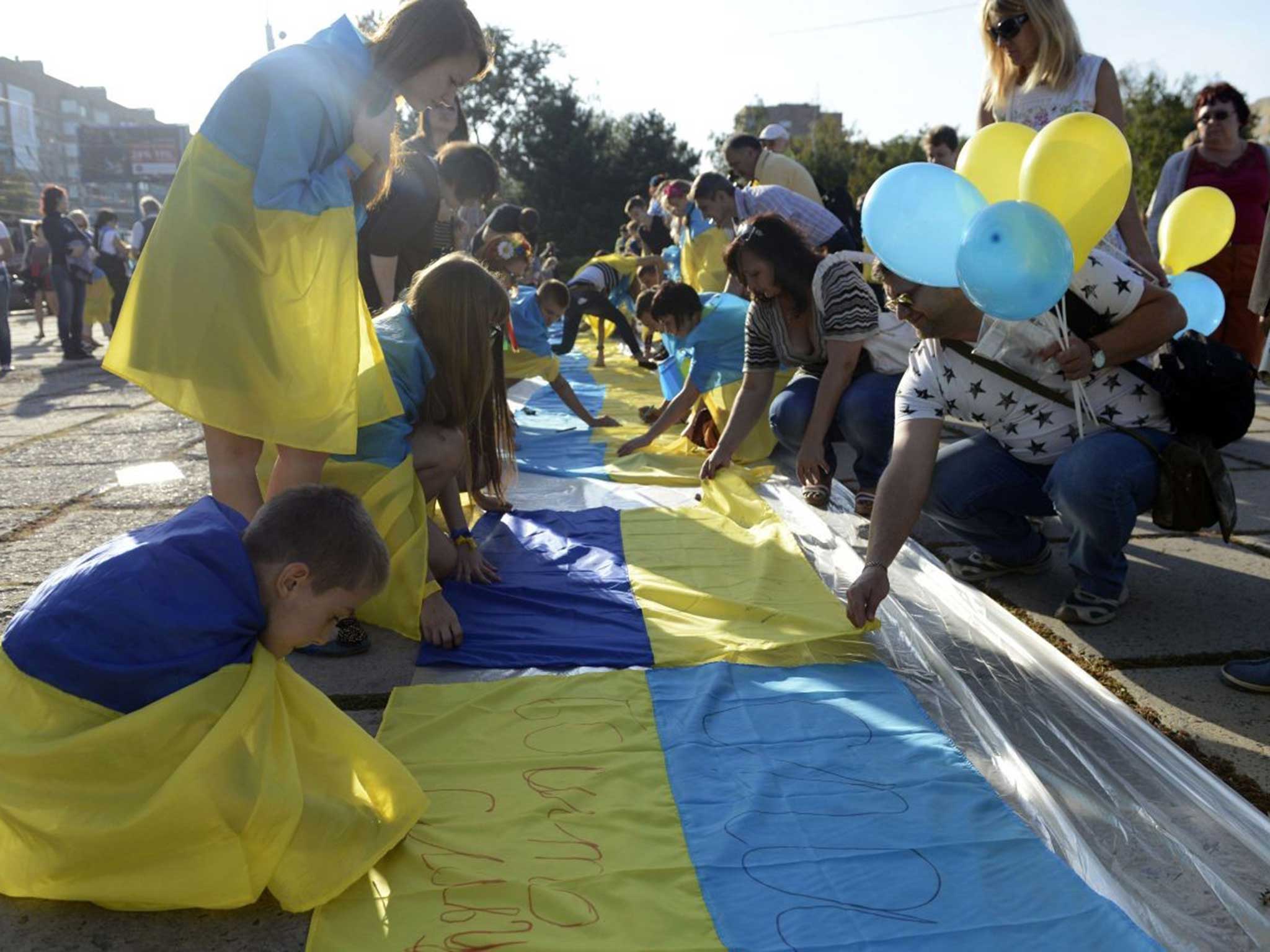Ukraine crisis: EU agrees a crucial Kiev trade delay to aid ceasefire
Putin said to have obtained surprise deal as the ‘price of peace’ in return for ensuring separatist fighters in the east stick to fragile truce

An unexpected decision by the European Union allowing Kiev to delay the implementation of a key trade agreement was part of a deal struck between Vladimir Putin and Petro Poroshenko over the ceasefire in Ukraine’s civil war, according to senior diplomatic sources.
The Russian president, it is claimed, obtained the concession in return for using the Kremlin’s influence to try and ensure that separatist fighters in the east stick to a truce which has, for the time being, reduced the ferocious violence which has claimed more than 3,000 lives.
It was the failure of President Viktor Yanukovych to sign the agreement with the EU, under pressure from Moscow, which led to the Maidan protests leading to his downfall last year. This time around, however, Ukraine will be able to keep its current tariffs until early 2016.
Russia has threatened to block imports from Ukraine if Mr Poroshenko’s government lowered trade barriers with the EU. The Kremlin maintains that such a move by Kiev would lead to Western produce flooding into its markets through its western borders without check.
The EU had, in the past, repeatedly stated that a third party, Russia, cannot play a part in its negotiations with Kiev because this would infringe on Ukrainian sovereignty. But Juan Manuel Baroso, the president of the European Commission, announced the deal, and Moscow’s role in framing it, on Friday evening.
Speaking at the annual international Yalta Conference, which is being held in the capital Kiev, after Crimea was annexed by Russia, Mr Baroso said: “ I am happy that today, with a trilateral meeting we had in Brussels between the European Commission, the Russian government and the and Ukrainian government, there was broad support for this. Let's see if this can now be the basis for a compromise."
On the same day, however, the EU imposed tougher sanctions on Russia for the annexation of Crimea and the supply of arms an, troops to the civil war in the east, with banks, arms manufacturers and the country’s biggest oil company, Rosneft, affected.
Speaking at the conference, Stefan Fule, the commissioner for enlargement, insisted that there were no contradictions in the stance of the EU. “We have made it absolutely clear that there is a red line, we cannot have third party involvement in Ukraine’s association talks. When it comes to this [ tariff levels] the Russians have been expressing their concern and we have considered this. We want to have trade relations and trade relations with Russia as well.”
A Western diplomatic source said: “We have heard that the delay in the trade deal was something which was discussed between Putin and Poroshenko. There may be criticism that Poroshenko had given in to Putin on this one from political opponents and people in the Maidan, but it was right of the EU to show flexibility on this if it helps with the ceasefire. There isn’t much to be gained by harping back on what happened with Yanukovych, the feeling is that we need to focus on the present and the future.”
EU trade commissione, Karel de Gucht, stated: “ This ongoing process needs to be part and parcel of a comprehensive peace process in Ukraine, respecting the right of Ukraine to decide on its destiny as well as the territorial integrity of Ukraine.”
But the research group, European Influence, held: “ The delay Is a personal disaster for Ukraine’s pro-Western political class and millions of expectant consumers, even if it is touted by the EU as the political ‘price of peace’. The alleged problems are simply Russia’s grievance of choice, rewarding the use of force by Russia makes Europe look weak.The most important part of Western response to the crisis is not the sanctions, important as they are, but the efforts to strengthen Ukraine’s statehood and economy.”
The airport in Donetsk, held by Ukrainian forces, came under attack again today from the rebels and there were deaths in clashes at the port of Mariupol. But both sides claim the ceasefire is largely holding and President Poroshenko has been at pains to present it as a success. He also stressed that there cannot be a military victory in the struggle against the Russian backed rebels and it was essential to maintain the dialogue with Mr Putin.
But the President is facing increasing opposition on the issue with parliamentary elections due in six weeks time. His prime minister, Arseny Yatsenuik, maintained that President Putin wants to destroy Ukraine as an independent country: “ We are still in a stage of war and the key aggressor is the Russian Federation, Putin wants another frozen conflict. His goal is take all of Ukraine, Russia is a threat to global order and to the security of the whole of Europe.”
Yulia Tymoshenko, defeated in the presidential race by Mr Poroshenko, declared:” We should call a spade a spade, we should stop the invasion by whatever means necessary. The terrorists backed by Russia have been responsible for 86 ceasefire violations, they have increased the area under their control by 15 per cent: so they are using the ceasefire to seize territory mapped out by Mr Putin.”
Join our commenting forum
Join thought-provoking conversations, follow other Independent readers and see their replies
Comments